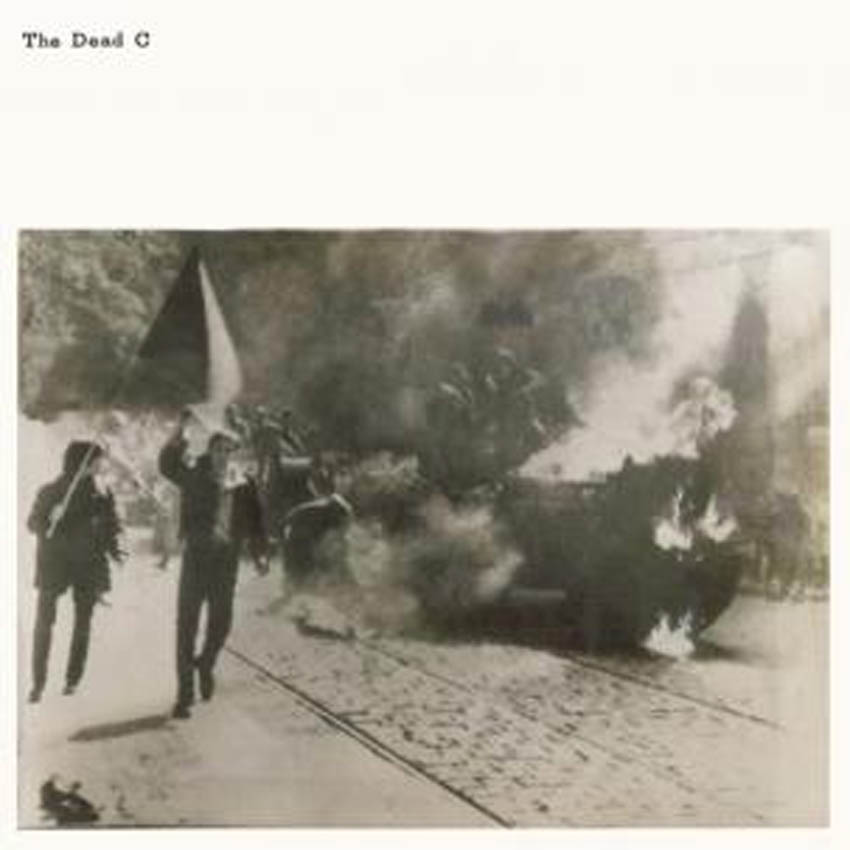 There is something endearingly heroic about The Dead C, as they have been gleefully blurring the lines between inspired deconstructionist rock and messy, half-assed indulgence to widespread indifference for almost three decades.  Unsurprisingly, this latest release finds them obstinately splashing about in the same ambiguously muddied waters as ever.  I suspect these two fairly challenging long-form pieces are unlikely to win the trio any new fans, but they are absolutely certain to please the already indoctrinated, as they rank among the group's finest.
There is something endearingly heroic about The Dead C, as they have been gleefully blurring the lines between inspired deconstructionist rock and messy, half-assed indulgence to widespread indifference for almost three decades.  Unsurprisingly, this latest release finds them obstinately splashing about in the same ambiguously muddied waters as ever.  I suspect these two fairly challenging long-form pieces are unlikely to win the trio any new fans, but they are absolutely certain to please the already indoctrinated, as they rank among the group's finest.
In their early days, Wire famously had a list of rules that defined their aesthetic, dictating that they always "stick to the point" and avoid such perils as rocking out, embracing Americanisms, or needlessly embellishing their songs in any way.  At this point in their career, I suspect The Dead C probably have an even more restrictive set of guidelines that likely includes such dictates as "no melodies, no structure, no consistent rhythm" and "never, ever seem like you are trying."  While I am being (somewhat) facetious, it is very hard to hear a song like "Armed" and not think that its genesis was anything other than "Hey, I've got a great idea for a new song: I'm going to stomp my distortion pedal and play a chord.  Then I am going to keep flogging that same goddamn chord relentlessly for the next 20 minutes with no apparent variation.  You guys in?"
While I do not think I am being too unfairly reductionist in that description, "Armed" still somehow works beautifully and avoids sounding like any of the "amplifier worship" bands (Sunn O))), etc.) that tread similar-sounding territory.  The secret seems to lie both in the details and in avoiding the expected trajectory, as guitarists Bruce Russell and Michael Morley imbue that droning chord with a great deal of simmering tension through layers of snarling wah-wah and distorted sizzle.  Drummer Robbie Yeats, for his part, alternates between clattering fills, silence, and an array of tumbling, lurching, and off-kilter martial-sounding beats.  The whole effect is quite impressive, resembling a constantly shifting smoldering wreckage of a song that never turns into anything more, yet never gets tiresome.
The second-half of the album, "Courage," arguably captures the band in "song" mode, as Morley initially mumbles and moans some half-asleep-sounding vocals over an electronic buzz, some tinkling piano, something resembling a beat, and some understated guitar abuse.  Gradually, however, Yeats' drumming gets more propulsive and the guitars get a bit harsher and the piece begins to resemble a perverse parody/homage of a motorik beat, albeit one with a drummer who has no intention of sticking to the script at all.  Then, around the half-way mark, all forward momentum halts and the piece gradually transforms into a fading, understated outro of slow-burning guitar noise that again resembles the gutted, ruined corpse of a rock song.
As far as Dead C albums go, Armed Courage is deceptively great: it initially seemed like two shambling, off-the-cuff jams to me, but the pieces all gradually fell into place after a few listens.  As inscrutable as these guys are, they definitely seem to be intuitively and inventively improvising against one another in a way that steers guitar noise into a realm that it is uniquely their own.  Notably, this is the first Dead C album where I have begun to appreciate the mad genius of Robbie Yeats' drumming, as his unpredictable transformations and derailments of even the simplest of beats keep these two songs  sounding like they could go barreling out of control at any moment.  That omnipresent sense of danger makes everything Morley and Russell play sound precarious and somewhat tense, which is no simple feat.  In anyone else's hands, an album like this would be crushingly boring: no melodic movement, no cathartic explosions–just 40 minutes of endlessly simmering guitar noise with seemingly random drums and no pay-off.  In The Dead C's hands, however, it is a refreshing and invigorating triumph of bloody-minded wrongness.
 
 
Read More

